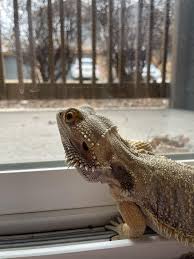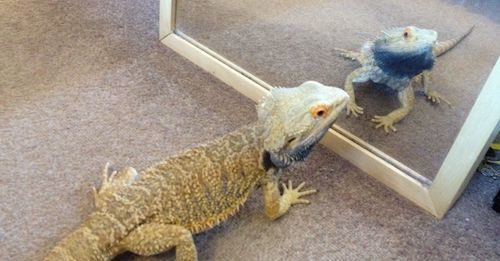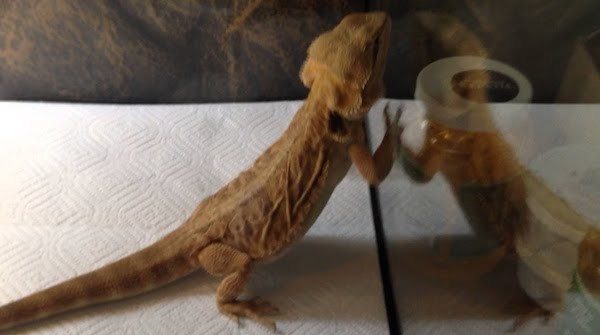If you’ve observed your bearded dragon persistently scratching at the glass walls of its enclosure, it may raise concerns. However, if your bearded dragon is scratching at its enclosure’s glass, it might be because:
- Curiosity: They might want to explore outside their home.
- Seeing Reflections: They might think their reflection is another bearded dragon and try to play.
- Boredom: If they’re not busy or entertained, they might scratch out of boredom.
- Temperature: They could be looking for a warmer or cooler spot.
- Feeling Stressed: If they’re feeling nervous or uncomfortable, they might scratch.
In this post, we’ll look at the probable causes of this behavior in bearded dragons and provide strategies to manage it efficiently.
How to Identify Why Your Bearded Dragon is Scratching?

If your bearded dragon is scratching, it could be due to various reasons. Here are some common factors to consider when trying to identify why your bearded dragon is scratching:
Reflections
Bearded dragons can get pretty territorial, especially when they see their reflection in the glass. They might think it’s another dragon trying to take over their turf. This can make them act all tough, like trying to show who’s boss or check out the new “dragon.”
This happens more often in males, especially during breeding season when they’re feeling extra protective. Sometimes, they might even do a little head-bobbing or arm-waving to show they mean business.
Hunger or Thirst
When bearded dragons scratch at the glass, it might mean they’re hungry or thirsty. They’re trying to tell you they need food or water. This could happen more during the daytime because that’s when they’re usually awake and moving around.
So, it’s important to make sure they have enough to eat and drink to keep them happy and healthy.
Boredom
When bearded dragons get bored, it’s because they don’t have enough interesting stuff around them. In the wild, they hunt and check out their surroundings, but in captivity, they might not have much to do.
In addition, this can make them scratch at the glass or act out. So, it’s important to give them things to explore and play with to keep them happy and healthy.
Improper Substrate
The stuff on the floor of the cage is called the substrate. If it’s not comfy or if it could make the dragon sick, they might scratch at the glass.
Stuff like sand or wood chips can get eaten by accident and cause problems. Some dragons just don’t like how certain substrates feel under their feet.
Health Issues
If a bearded dragon keeps scratching at the glass all the time, it could mean they’re not feeling well. They might have bugs like mites bothering them, or they could be sick inside with things like breathing problems or problems with their metabolism. When their behavior changes, like scratching a lot, it could be a sign that something’s wrong.
Mites are like little bugs that bug them and make them feel itchy. Breathing problems can make them tired and not want to move around. And if they’re not getting enough calcium, it can make their bones weak and affect how they act.
Seeking Attention
Bearded dragons are pretty smart and can figure out that certain actions get them attention from their owners. If they realize that scratching at the glass makes you come over or lets them out of their home, they might keep doing it to get noticed.
Moreover, they learn from what happens to them, so if you always pay attention to them when they scratch, they’ll keep doing it to get your attention.
Inadequate Enclosure Size
If a bearded dragon’s home is too small, it can make them feel stressed out and act differently. They need enough room to walk around, climb, and soak up the sun.
Bearded dragons like to move and explore, so if they don’t have enough space, they might feel trapped and unhappy.
Here’s a simple table summarizing the recommended enclosure sizes for bearded dragons based on age:
| Age Group | Recommended Enclosure Size |
| Juvenile (0-6 months) | 20-gallon long tank (30″ x 12″ x 12″) or larger (e.g., 40-gallon breeder) |
| Sub-Adult (6-12 months) | 40-gallon breeder tank (36″ x 18″ x 18″) or larger |
| Adult (12 months and older) | 75-gallon tank (48″ x 18″ x 18″) or larger (consider custom-built enclosures) |
What Can You Do to Stop a Bearded Dragon from Scratching?

First off, try to reduce any reflections in their enclosure by adding a background and keeping the glass clean. This can help them feel more secure and less stressed. Make sure they’re eating right by offering a balanced diet of insects and vegetables, along with fresh water. Keep their home interesting by adding things like rocks, branches, and tunnels for them to explore.
Besides, choose safe bedding materials like reptile carpet or ceramic tile to keep them comfy. Keep an eye on their health and behavior, and take them to the vet if you notice anything unusual. Spend quality time with your dragon every day, rewarding good behavior with treats.
And finally, make sure they have enough space to move around comfortably in their enclosure as they grow. By following these tips, you can help your bearded dragon live a long and happy life.
How to Monitor and Address Bearded Dragon Scratching Behavior?
Monitoring and addressing scratching behavior in bearded dragons is important to ensure their health and well-being. Here’s a guide on how to do so:
- Watch your dragon: Keep an eye on your bearded dragon to see if it scratches itself often.
- Check for bugs: Look closely at its skin to make sure there are no tiny bugs like mites or ticks.
- Fix its home: Make sure your dragon’s home is comfy. Keep the air moist and use soft bedding.
- Keep its skin healthy: Give your dragon plenty of water and good food to keep its skin nice.
- Trim its nails: If its nails are too long, it might scratch itself by accident. Trim them carefully.
- Make it happy: Give your dragon fun stuff to do, like hiding spots and toys, so it doesn’t get bored.
- Visit the vet: If your dragon keeps scratching or seems sick, take it to the vet to make sure it’s okay.
FAQ’s
Here are answers to some of the questions you ask a lot.
Bearded dragons may show affection by seeking interaction, basking on you, or appearing calm in your presence.
No, bearded dragon bites are generally mild and rarely cause significant pain, more like a pinch.
Dehydrated bearded dragons may exhibit sunken eyes, wrinkled skin, and lethargy.
Abnormal signs include lethargy, changes in appetite, labored breathing, or any deviation from their usual behavior.
Bearded dragons perceive humans as larger beings and may show recognition through calm behavior and curiosity.
While reptiles may not feel love in the way mammals do, bearded dragons can form bonds and show affection towards their owners.
Final Words
Figuring out why your bearded dragon scratches is very important for its happiness. It might scratch because it sees itself, feels hungry or bored, doesn’t like the ground, or wants more room. By fixing these things, you make your dragon happier and healthier.
So, stop reflections, give good food, make their home fun, and check with the vet. Watch your dragon, play with it, and make its home comfy as it grows. That way, you and your bearded dragon can be best buddies!

